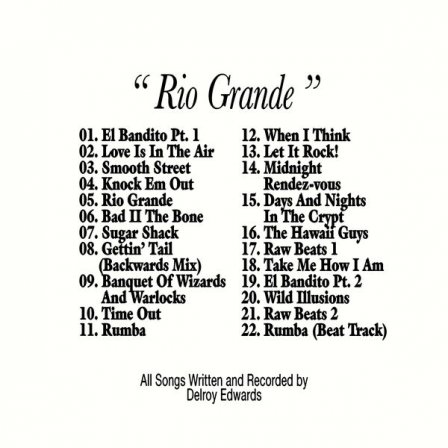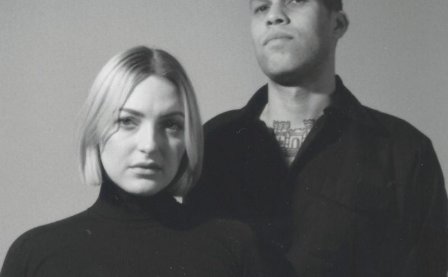A few weeks ago, I was hanging around the KCHUNG radio station in Los Angeles, talking to another DJ about his techno set. As we were chatting about the songs he was playing, he started telling me that, in spite of how seriously people take dance music culture, most DJs are actually just goofing around. He said that, during its 90s heyday, rave music was more of a parody of itself than some slick, buttoned-up ideal of black-cap cool, and that ultimately Coachella bros were probably more in touch with the true spirit of dance music than most deep techno heads. Fittingly, the last time I was in the station, he had played “From Disco To Disco,” a 90s hit from Cologne house group Whirlpool Productions in which, over an impossibly velvety keyboard lick, the trio ad-lib the song’s hook while clinking their glasses, often messing up the words and pausing to crack up at one other. In its refusal to keep a straight face, the song is pure joy.
Cut to Delroy Edwards, whose latest release for his L.A. Club Resource label finds him similarly casting off the often cold veneer of techno in exchange for something far more silly and adventurous. Over the past several years, the Los Angeles-based DJ (whose father happens to be none other than Ron Perlman, technically making Edwards the son of Hellboy) has gradually lightened the mood of his fashionably minimal label’s output, breaking away from the stark, club-oriented sounds and moving toward a more personal, mischievous vibe. Hangin’ At The Beach, his 2016 debut, felt not like the coming out work of a rising underground producer, but like a jumbled cardboard box full of half-scrawled notes and ridiculous inside jokes. The beats were still there, but they were sandwiched between dozens of winking, minute-long mood pieces and sketchy no-wave instrumentals, depicting Edwards as less of a gritty lo-fi house lord and more a wisecracking builder of miniature worlds.
For his second full-length, Rio Grande, Edwards finds the sweet spot between Hangin’ At The Beach’s sprawling sense of freedom and his hardwired house roots. Lined with 22 tracks of hissy, straight-to-tape beats and billed as a “space age western,” Rio Grande is as fantastical as it is low-key, a miniature epic that’s as fit for yawny afternoons as it is for late-night sagas. As with his previous LP, each track here is mercifully short, with Edwards picking one idea at a time to mess with before cutting the cord and moving onto the next thing. Edwards keeps his sound loosey-goosey, filling out his grainy, black-and-white universe with flashes of disco cheese and lounge swagger, managing throughout it all to paint an incredibly fleshed out milieu from the barest (and most low-grade) of elements.
Like the John Ford film that it shares its name with, Rio Grande imbues its larger Western tableau with smaller, more insular dioramas. Edwards populates the record with brief sketches like “Midnight Rendez-vous” and “The Hawaii Guys,” the former an apt soundtrack to a horseback canyon pursuit, the latter like something straight out of a zany heist plot. When he’s not using broad strokes to create a low-end-fueled mise en scéne, Edwards takes to the club with some of his hardest hitting cuts to date; tracks like “Take Me How I Am” and “Wild Illusions” rumble with coarse drum kits and wistful synth samples, maintaining a sense of humor while letting Edwards show off his prowess behind the decks. Perhaps most playful are Rio Grande’s beat-only songs like “Raw Beats 1” and “Rumba (Beat Track),” on which Edwards lets his drum machines pulse without any other decoration, sitting back in his chair and relishing in the sounds of pure, unadorned rhythm. It’s as if he’s letting us in on his own process of constructing tracks and reminding us that even a number as laughably simple as “Raw Beats 2” (which literally consists of one drum loop repeated for almost three whole minutes without variation) is still ultimately cutting to the core of what dance music is supposed to be about in the first place.
Delroy Edwards’s latest has plenty of room to wiggle between its various modes, and it often manages to pull them all off at the same time. It presents a version of dance music that’s faithfully old school while still eager to build new sonic realms, valuing freedom, expression, and fun above all else. In that way, it’s closer to that original ethos of club music than so much other image-savvy techno out there, loosening the reins on its own self-importance and inviting us to take our own goofy voyages down whatever path might suit our fancy. Rio Grande is a reminder from Delroy Edwards that the club isn’t just a black box; it’s a wild frontier.
More about: DELROY EDWARDS




